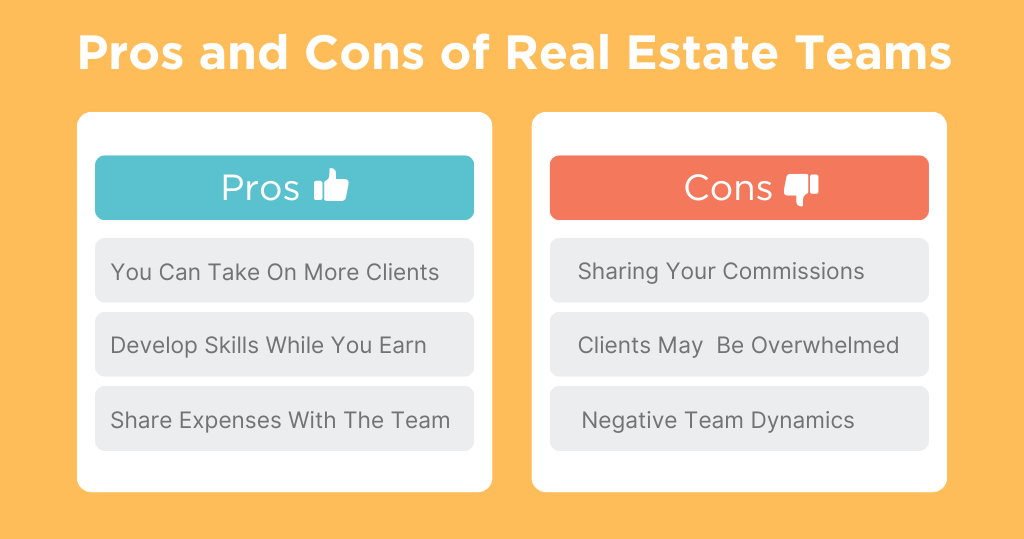Selling a home can be challenging. That’s why many real estate agents form “real estate teams” to make the process easier. A real estate team is a grouping of two or more agents who come together to share resources and overcome obstacles as a cohesive unit.
Although not all real estate agents prefer a team structure, it is growing in popularity and offers countless advantages to both agents and their clients. Here is a closer look at real estate teams and how they work.
Table of Contents
What Is The Purpose Of A Real Estate Team?
The purpose of a real estate team is to combine forces with other professionals to share resources, delegate tasks, and share commissions to better support the client. Everyone has strengths and weaknesses. Some agents are great with clients but struggle with negotiation. Others are skilled negotiators but less adept at marketing and finding listings.
In some instances, older, more established real agents may have a large network and abundant resources at their disposal but lack the time and energy to fully service all the business. Alternatively, a young agent may have all the time and energy in the world but hasn’t been in the business long enough to build a name for themselves.
As a result, many agents utilize real estate teams to play to their strengths and delegate some of the tasks they may struggle with to someone better equipped for that role. Real estate teams often have a hierarchical team structure with a chain of command that allows for a more efficient decision-making process. Plus, combining the talents and resources of multiple real estate professionals allows for a smoother flow of information that can make the process much smoother.
How Are Most Real Estate Teams Structured?
Real estate teams can be structured in a number of different ways. However, typically, one agent is designated as the team leader that handles the listings. Then, one or more team members underneath them will work with the buyers and handle the minor tasks required to close the sale.
Typically, team leaders are more experienced and have the reputation and professional network needed to provide a constant pipeline of listings. They then delegate individual tasks to the rest of the real estate team, so the leader can focus their energies on finding new businesses.
The exact team structure and specialization of each member depend on the size of the real estate team. For instance, if it’s a team of two, then the team leader will handle the listings, and their partner may handle everything else.
If it’s a larger team, each member may be assigned a specific responsibility. One member may be solely responsible for organizing open houses, while another may be concerned with drafting the purchase contracts.
Dividing these tasks and delegating them to a specific person can make things more efficient and turn the real estate team into a well-oiled machine. However, that also requires the team leader to develop a functional organizational team structure to ensure everyone stays productive and on-task.
Benefits Of Using Real Estate Teams

Real estate teams can be highly beneficial when executed correctly and allow everyone on the team to benefit from the skills and experience of the other real estate agents. Here are some of the main benefits of using real estate teams.
Serve More Clients at Once
One of the main benefits of utilizing a real estate team structure is the ability to take on more clients at once, increasing your earning potential. There are only so many hours in the day and you can’t be everywhere at one time.
No matter how much business you have knocking at your door, as an agent working solo, you can only take on so many clients at one time before you’re stretched too thin. Creating a real estate team allows you to scale your business and take on more clients without overworking yourself. Delegating specific tasks and responsibilities allows team leaders to take some of the burdens off their shoulders and focus more on developing relationships and bringing in new business.
Develop Your Skills While You Earn
Joining a real estate team also has fantastic benefits for members. For real estate agents who lack experience, closing your first sale independently may feel like a daunting task. By joining a real estate team, you can develop your skills under the direction of a more experienced team leader. Plus, you’ll be earning money while you develop these skills, which may be different if you try to go it alone and make a mistake that costs you business.
Share The Expenses
Working as a real estate agent can get expensive. You’re required to pay certain expenses out of pocket, such as marketing materials, desk fees, phone bills, and other costs related to running your business. Working with a real estate team allows you to pool those expenses with a larger group, making the costs more manageable.
For team leaders, sharing commissions with other real estate agents is often less expensive than hiring a full-time assistant or transaction coordinator to manage some of your workload.
- You Can Serve Multiple Clients At The Same Time
- You Can Share Expenses With Other Team Members
- You Can Develop Your Skillset While Generating Income
Disadvantages Of Using Real Estate Teams
Although real estate teams can benefit many agents, they also come with pros and cons. Here are a few main disadvantages of joining a real estate team.
Sharing Your Commissions
Although doing everything on your own takes more work, you get to keep the entire commission. When you work with a real estate team, you must split that commission with everyone who contributed to the project. Depending on how many people are on the team, your commission may be significantly reduced by the time you get a cut. As a result, you’ll want to be sure that working with the team will allow you to take on extra business, so it justifies the split.
Not All Teams Work Well Together
Real estate teams are a great idea, in theory. However, the reality of coordinating and managing a group of people is often easier said than done. Sometimes personalities clash, or there are disparities in the work ethic or skill level of individual team members. Agents may get resentful if they feel like they’re putting in the brunt of the work yet splitting their commissions with less motivated team members. So, as a team leader, you’ll want to be sure you’re prepared to deal with the added complexities of managing a team.
Clients May Feel Overwhelmed
Some clients prefer to work with one agent directly and may feel overwhelmed or confused by having multiple people working on the transaction. So, as a team leader, you’ll want to make sure the communication is clear and you manage the relationships properly, so the client doesn’t feel neglected.
- You Have To Share Commissions
- Your Team Might Not Work Well Together
- Clients Might Be Confused When Working With Multiple Team Members
Should You Build A Real Estate Team?
Real estate teams can be an excellent way for real estate agents to combine their resources and benefit from the skillsets and perspectives of their colleagues. Team leaders can also benefit from the ability to delegate tasks and share the workload, so they can focus on bigger-picture concerns.
However, for real estate teams to be successful, they must have a clear team structure and good working chemistry. Otherwise, you’ll end up experiencing friction that will make the setup unmanageable.


